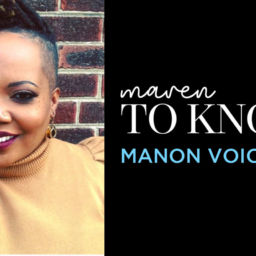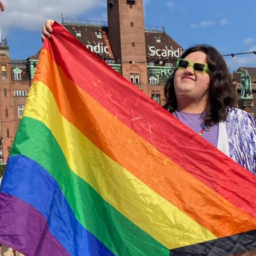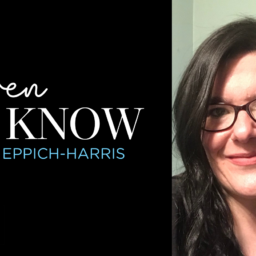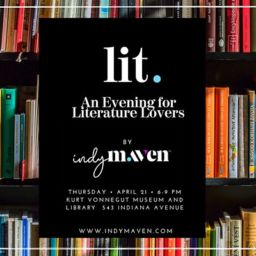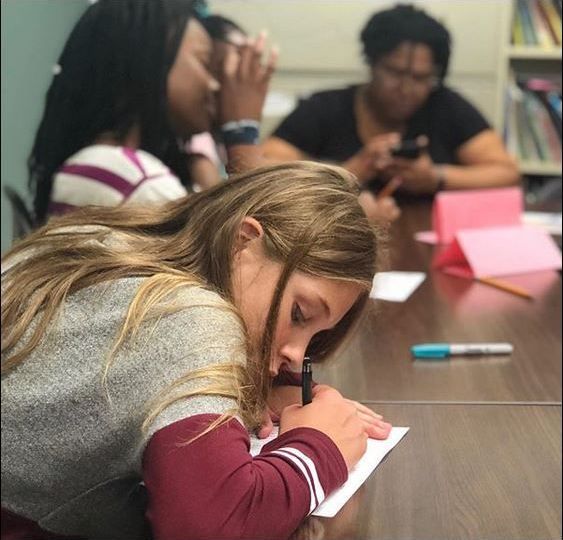
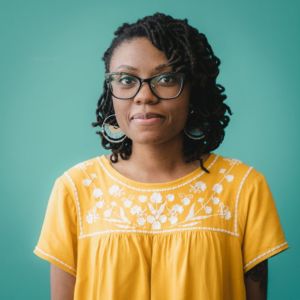
Picture this: a skinny Black girl, no more than 20 years old, unsure of herself and the power of her own voice. She scurries around her predominantly white college campus—folding into herself, keeping her head down. She knows deep inside that she’s got a lot of words to say. The words are buried somewhere deep, but they’re present, humming.
If only she knew how to dig them out. At night, she climbs up on the top bunk in her tiny college dorm room, shoves her earphones in and spends hours watching grainy bootlegged YouTube videos from Mos Def Poetry Jam. Her body rocks with the rhythm of the words. Women in low-rise jeans and bandana crop tops who spit power-packed words about self-respect. Men with baggy pants and even baggier shirts who sway from side to side, with tears in their eyes and weave stories about true love and passionate kisses on the New York subway platform. She’s moved. She decides that this is what she wants to do. To tell stories with her words. She pulls out a notebook and begins writing. The words spill out of her, but she holds them close. Doesn’t want to share them with anyone just yet. And still the feeling tugs at her and the question nags. What if she did? What if she got up on stage and let the words just flow? And what if she taught others how to do it too? Would anyone listen to her? Would it be possible?
She begins to plot and plan. One day, she says. One day it will all come together. First, she must get better at writing. She must improve her craft and then one day when she’s ready, when she’s finally made something of herself and she’s no longer folding into herself, she will teach others.
She reads an article in her college’s newspaper. (What are the chances? She’s never done that before, and she never will again.) The article is talking about one of the college professors in the English department, Dr. Lyn Jones. The article talks about how Lyn works with an organization called the Indiana Writers Center, and in the summers they work with vulnerable and marginalized populations of kids in Indianapolis to help them record their stories.
Now picture this: The skinny Black girl’s heart skips a beat. She thinks, Maybe if I can talk to this woman, she can point me in the right direction. And maybe I can be like her one day. She schedules a meeting, goes to sit in Dr. Jones’s office and leans in hungrily. Dr. Jones tells stories of the work she does with the students of the Indiana Writers Center’s summer program, Building A Rainbow. And then she turns to the skinny Black girl and says the magic words: You should come work with us. The skinny Black girl is shocked. Me?! But you don’t know me! Dr. Jones smiles and says, But you took initiative, and we want to work with students like you.
And so it begins.
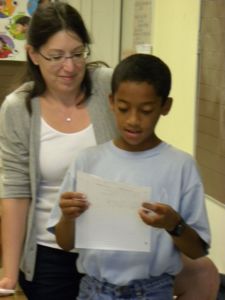 The skinny Black girl goes and spends her first summer with the Indiana Writers Center as their spoken word poetry intern. She teaches spoken word poetry to a group of skinny Black boys and girls (much like herself). They stand up tall and speak of how proud they are to be Black. She goes to La Plaza and works with bilingual Spanish speaking students. They write about their favorite foods and how proud they are of their families and their culture. They write about how certain politicians and their hurtful stereotypes make them angry. The students are raw, authentic and real. The skinny Black girl didn’t know all this could happen. She hadn’t yet “arrived”, hadn’t made it as a writer, didn’t know how to be a teacher. And yet, in the process of her own learning, she finds her voice.
The skinny Black girl goes and spends her first summer with the Indiana Writers Center as their spoken word poetry intern. She teaches spoken word poetry to a group of skinny Black boys and girls (much like herself). They stand up tall and speak of how proud they are to be Black. She goes to La Plaza and works with bilingual Spanish speaking students. They write about their favorite foods and how proud they are of their families and their culture. They write about how certain politicians and their hurtful stereotypes make them angry. The students are raw, authentic and real. The skinny Black girl didn’t know all this could happen. She hadn’t yet “arrived”, hadn’t made it as a writer, didn’t know how to be a teacher. And yet, in the process of her own learning, she finds her voice.
The Indiana Writers Center has a way of doing this sort of thing to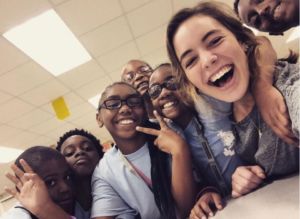 people. The mission, the classes, the community building aspect of the organization and the attitudes of the women who run it all—everything draws you in, has you believing things you didn’t know were possible about yourself and has you dreaming up new ways to invest in your community.
people. The mission, the classes, the community building aspect of the organization and the attitudes of the women who run it all—everything draws you in, has you believing things you didn’t know were possible about yourself and has you dreaming up new ways to invest in your community.
Barb Shoup has been there the longest. When I (the skinny Black girl) first met her she was the executive director of the non-profit; she’s now the writer-in-residence. She recently told me, “I took my first writing class at the IWC in 1979 and have been involved, one way or another, ever since. I had no training in writing, I had no idea how to begin—or that there were real writers living in Indiana . . .I took classes; then, after my first novel was published in 1982, I started teaching classes . . .When I took over as executive director–[it] happened sort of by accident. Our current director had just resigned . . . I said, sort of to my own surprise, ‘I guess I could do it on a volunteer basis for a while.’ I ended up serving as the director for 10 years!”
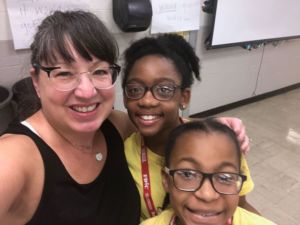 There’s something to be said about the communal aspect of an organization that keeps people coming back consistently class after class and that has leadership pouring into its roots and foundation for over a decade. The women in leadership at the Indiana Writers Center have always been supportive of me, each other and the larger community of writers here in the state.
There’s something to be said about the communal aspect of an organization that keeps people coming back consistently class after class and that has leadership pouring into its roots and foundation for over a decade. The women in leadership at the Indiana Writers Center have always been supportive of me, each other and the larger community of writers here in the state.
When I asked Rachel Sahaidachny, the current executive director, why she has been with IWC for this long, she said, “I have stuck with IWC because I believe in the mission. I am a writer, and the Indiana Writers Center has helped me achieve some of my personal goals over the years.
I stay for the mission and also for the relationships that develop here through IWC. I love working to support writers and help them achieve their goals, and being an advocate for the literary arts in Indiana.”
And there’s so much truth to this. The Indiana Writers Center has created the kind of environment where anyone can flourish. They help you find your strengths as a writer and lean into them, through workshops like their summer learning program and the Memoir Project. Both encourage people to write the stories of their lives. Since 2009 they’ve partnered on programs with almost one hundred community organizations like Flanner House, Wheeler Mission, Asante Children’s Theatre, the Indianapolis Public Library, and Dance Kaleidoscope. It’s through these programs that distinct voices of the community have emerged.
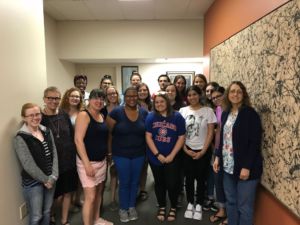 The investment in community storytelling is evident, but it’s also the passion of each of the individuals who run the programs that propel the organization forward and into the future. It’s the passion to keep pursuing and amplifying the voices of vulnerable and marginalized groups that grounds so much of the work IWC continues to do.
The investment in community storytelling is evident, but it’s also the passion of each of the individuals who run the programs that propel the organization forward and into the future. It’s the passion to keep pursuing and amplifying the voices of vulnerable and marginalized groups that grounds so much of the work IWC continues to do.
When I reached out to Dr. Jones, the education outreach director, to have her speak on her experiences with the Indiana Writers Center, her emotion was palpable. She relayed story after story of adults and children who took IWC workshops and classes—who through writing, revealed the deepest parts of themselves and shared openly with her as their instructor. 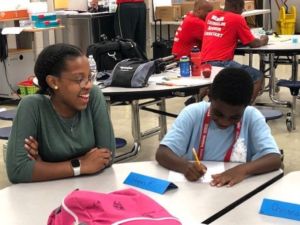
“You can’t hear the stories I’ve heard over the years, with all the groups I’ve worked with, and not just be radically changed,” Jones said. “Because I have just heard some of the most incredible stories of heartbreak, trauma, but then resistance, resiliency. This is my definition, but I define memoir as the extraordinary story of an ordinary person’s life. And that’s what I got to hear over and over.”
This passion and mode of thinking is what initially drew me to the Indiana Writers Center. And that is also why I have chosen to stay, scrambling to get as much time in the classroom as they will allow me. It’s through my experiences teaching with them that I’ve been able to more fully experience my own community. And therefore, I’ve been able to know myself more fully.
So picture this: The skinny Black girl is now a skinny Black woman. She’s been working on and off with the Indiana Writers Center for almost six years. It’s because of them that she realized how deeply she enjoys teaching others. She’s taught poetry and writing to countless kids of color and she’s not stopping any time soon. She’s taught in schools emptied out for summer break, in the downtown library, in community centers and now in the midst of a pandemic. She loves to hear the stories that spill out of the mouths of her students and in turn, they become her stories too. She holds them close.
Interested in the Indiana Writers Center? IWC is hosting a new virtual event, Spring into Writing, a four-genre workshop bundle to help you kick start your writing. You can try out different classes in four different genres: fiction, creative nonfiction, poetry, and playwriting. You can also take the classes individually. For more info: https://www.indianawriters.org/product/spring-into-writing-workshops/
IWC is also having a special free event during Spring into Writing, with authors Angela Jackson-Brown and Crystal Wilkinson who will be in conversation about Angela’s new book WHEN STARS RAIN DOWN. For more info, check out their website: https://www.indianawriters.org/product/call-response-a-conversation-between-authors/
If you’re reading this and think your organization could partner with the IWC on a project, please reach out! You can contact the IWC Program Manger, Sarah Ginter, via her email sarah@indianawriters.org







